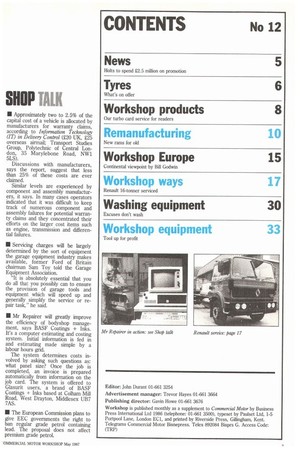SHOP TALK
Page 87

If you've noticed an error in this article please click here to report it so we can fix it.
• Approximately two to 2.5% of the capital cost of a vehicle is allocated by manufacturers for warranty claims, according to Information Technology (IT) in Delivery Control (£20 UK, £25 overseas airmail; Transport Studies Group, Polytechnic of Central London, 35 Marylebone Road, NW1 5LS), Discussions with manufacturers, says the report, suggest that less than 25% of these costs are ever claimed.
Similar levels are experienced by component and assembly manufacturers, it says. In many cases operators indicated that it was difficult to keep track of numerous component and assembly failures for potential warranty claims and they concentrated their efforts on the larger cost items such as engine, transmission and differential failures.
• Servicing charges will be largely determined by the sort of equipment the garage equipment industry makes available, former Ford of Britain chairman Sam Toy told the Garage Equipment Association.
"It is absolutely essential that you do all that you possibly can to ensure the provision of garage tools and equipment which will speed up and generally simplify the service or repair task," he said.
• Mr Repairer will greatly improve the efficiency of bodyshop management, says BASF Coatings + Inks. It's a computer estimating and costing system. Initial information is fed in and estimating made simple by a labour hours grid.
The system determines costs involved by asking such questions as: what panel size? Once the job is completed, an invoice is prepared automatically from information on the job card. The system is offered to Glasurit users, a brand of BASF Coatings + Inks based at Colham Mill Road, West Drayton, Middlesex UB7 7AS.
• The European Commission plans to give EEC governments the right to ban regular grade petrol containing lead. The proposal does not affect premium grade petrol.
























































































































